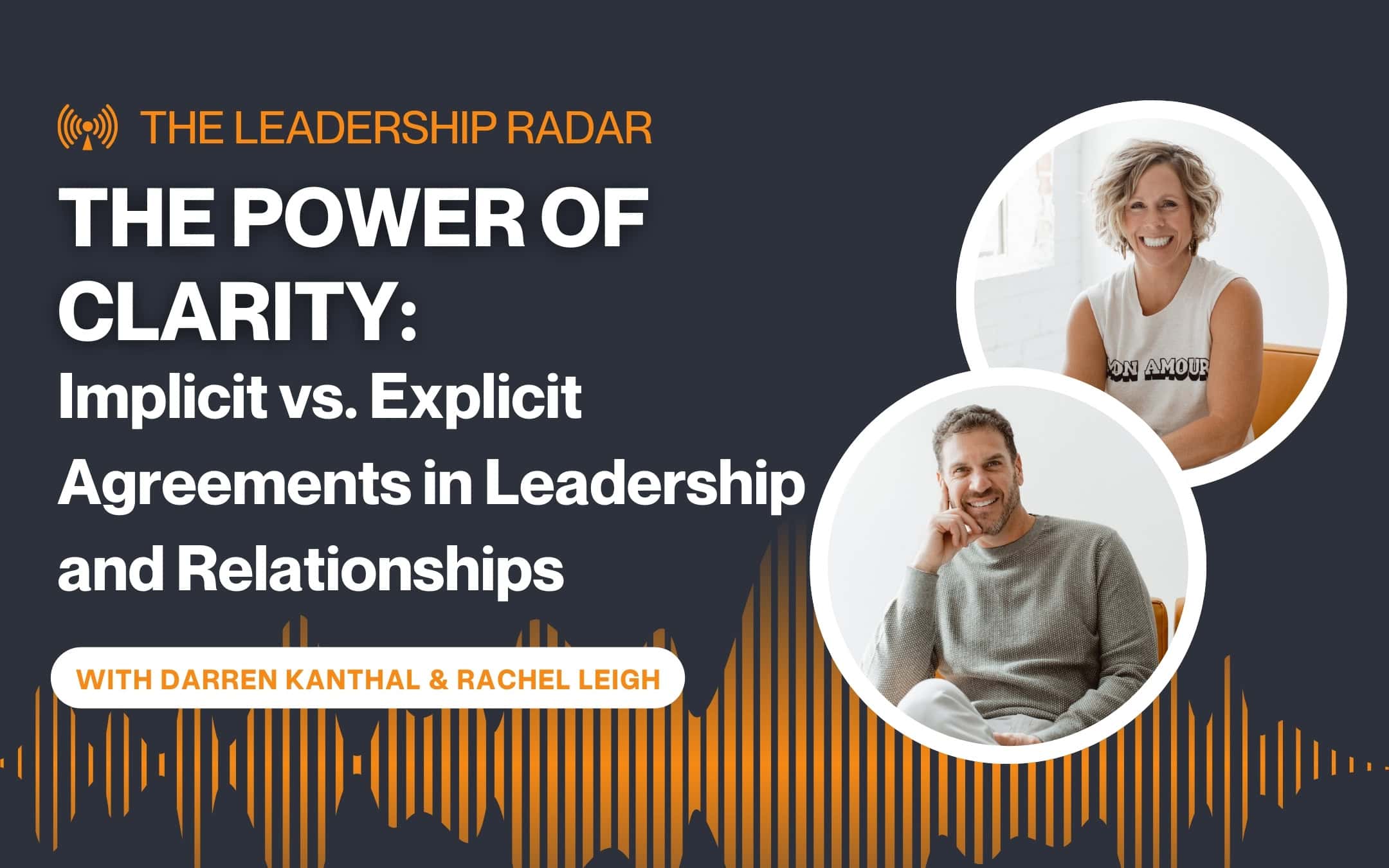“You can be as clear as you think, but if you don’t ask the other person what they heard, you haven’t finished the communication cycle.” — Rachel Leigh
Brief Summary/Overview:
In this episode of The Kanthal Group LinkedIn Live, we explore the concept of implicit and explicit agreements in both professional and personal relationships. We dive into our experiences as partners in life and business, highlighting the importance of clear communication in minimizing misunderstandings.
Together, we unpack the difference between unspoken expectations (implicit) and clearly stated expectations (explicit), and how addressing this gap can transform leadership and improve relationships. Tune in as we share practical insights, personal stories, and coaching tips that you can implement in your daily life.
Key Takeaways:
- The importance of speaking the unspoken: why clear expectations matter in leadership and relationships.
- How implicit agreements can lead to frustration and inefficiency in both work and personal settings.
- Practical tools for ensuring explicit communication, including how to “close the loop” in conversations.
- Insights on how asking for clarity can improve team dynamics, minimize miscommunication, and strengthen trust.
- Personal experiences of balancing life and work, and how we’ve applied these principles to improve our own partnership.
Timestamps:
- 0:00 – Introduction: We kick off the conversation by introducing the theme of implicit vs. explicit agreements.
- 5:09 – Rachel and Darren discuss their personal experience of blending a personal and business partnership.
- 8:44 – The importance of closing the loop in communication and why simply stating your expectations isn’t enough.
- 12:13 – Darren highlights how unspoken assumptions can lead to unnecessary frustration at work.
- 14:47 – We reflect on the emotional toll miscommunication takes and the importance of being clear upfront.
- 18:21 – The power of recognizing when your “heart is at war” and the tools we’ve used to get back on the same page.
- 22:45 – Rachel explains the role of the brain in jumping to conclusions and creating narratives in the absence of clarity.
- 24:11 – Darren and Rachel share how these tools have been game-changers in both their relationship and with their clients.
Join Us On LinkedIn
Follow us on LinkedIn for more real-time coaching insights and inspiring conversations during our next LinkedIn Live! We go live every Tuesday at 9:15 AM MT. Follow us on LinkedIn to get notifications and stay connected:
Don’t miss out on the opportunity to join the conversation and engage with us live!
Transcript:
Rachel: All right, everyone, we are going live. This is the second LinkedIn Live for the Kanthal Group with Rachel Leigh and Darren Kanthal. Today, we’re talking about implicit and explicit agreements. Before we get started, let’s talk a little bit about what we do and why this is important. The Kanthal Group provides executive coaching, and one of the key things we recognize in executive coaching and leadership development is communication.
We’ll explore some causes of miscommunication, how it feels, how it may affect the organization, and some tools you can implement to mitigate it. So, Darren, our mighty CEO and leader here, is known for helping clients shore up their communication. But before we dive into that, you’re also known for really bad dad jokes. So if you only stay for one thing, stay for the dad jokes. Take it away, Darren—what do you have for us today?
Darren: All right, last week, you didn’t get the joke until two hours later.
Rachel: I know! So don’t make them so complicated for me.
Darren: Well, there are only so many dad jokes out there.
Rachel: Make them easier, whatever.
Darren: All right, here’s one. I went to McDonald’s today and ate a kid’s meal. It was good, but his mom was furious.
Rachel: You told me that one before—I don’t think it’s funny.
Darren: Well, I needed to tell it. It’s been on my task list for weeks. So, there’s the McDonald’s joke.
Rachel: I thought the one you put in today’s newsletter was really good—that was crafty.
Darren: That was the one I told you last time, which you didn’t get.
Rachel: I need a few iterations sometimes. By the way, if you haven’t signed up for our newsletter, drop us a line, and we’ll get you on it. If anything, stay for the dad jokes. Okay, let’s dive into implicit and explicit agreements. Darren and I are partners in life and business, which can get tricky. It’s a totally different dynamic when you combine a personal relationship with a business one.
Darren: Yes, I understand.
Rachel: We’ve worked really hard to protect our personal relationship, making sure it doesn’t get compromised by the business side. One of the tools that’s helped us a lot is making sure we’re clear in our communication, expectations, and agreements. We need to ensure that the other person fully understands. So, what does that mean exactly? I want to read you the definitions of implicit and explicit agreements. Implicit means implied but not plainly expressed. Explicit means stated clearly and in detail, leaving no room for confusion or doubt. That last part is key—no room for confusion or doubt.
Darren: Yep.
Rachel: I think that that is super important that there is no room for confusion or doubt, because that’s where you and I would get in trouble sometimes. It would lead to fighting, frustration, and misunderstandings. It creates this feeling of like completely pissed off, right? It creates separation. At the end of the day, we’re on the same team and we recognize that and we’re trying to move towards that, but we needed to shore up our communication, and then we thought, this is exactly what we coach our clients on. This is also super important in leadership. So Darren, why don’t you share your experience with implicit and explicit agreements, since you brought this concept into our relationship?
Darren: Sure. It’s important to note that we were only introduced to this concept in the last three to six months. In our work as executive coaches, we often have clients who express doubt—like, “Am I a good leader?” or “Does my boss think I’m doing a good job?” My first question is always, “Did you ask?” Most of the time, the answer is no. That was the first sign that people aren’t having explicit discussions. Their minds imply things like “I’m not good enough,” “My team isn’t satisfied,” or “My boss is unhappy.” The second thing is, explicit versus implicit is about speaking the unspoken. In many areas—corporate America, personal relationships, sports—there are unspoken rules. In our relationship, there are times when you have unspoken expectations of me, and I have unspoken expectations of you. Neither of us know the expectation is there. We don’t meet the expectation and now all of a sudden we’re disappointed.
Rachel: Mm-hmm.
Darren: So, for us, and for a lot of leaders we work with, it’s about stating the agreement and the expectation clearly. Then, ask the other person to repeat it back in their own words to make sure everyone’s on the same page.
Rachel: That’s key. Like I said to you earlier this morning, it’s about closing the loop on communication. What you say, what it means to you, and then it has to jump to the receiver. What did they hear? What are they making it mean? When we go through this process, my story is often completely different from your story. That’s driven by culture, society, different learning styles, and more. You can be as clear as possible, but if you don’t ask the other person what they heard, you haven’t finished the communication cycle.
Darren: Exactly. Recently, I’ve been coaching leaders who think they’ve been super clear, but they didn’t close the loop with the other person. They didn’t ask, “What did you hear? How did you understand me?” And, let’s be honest, asking someone to clarify what they heard can feel awkward or condescending, but it’s crucial to ensure understanding. You make an explicit request, then ask the other person to repeat it back to make sure they really get it.
Rachel: Right, that takes practice. It’s about your body language, tone, energy—how you’re delivering the message. It won’t always come out perfectly, but that’s part of the process.
Darren: Definitely.
Rachel: And when someone asks you, “What did you hear?” you can’t just nod and give lip service. You have to really engage with the communication.
Darren: Thank you!
Rachel: Some clients I’ve worked with, especially women, will nod and agree without really clarifying or questioning. They don’t want to dissent or seem like they don’t understand, but it’s so important to advocate for yourself and be clear.
Darren: Absolutely. Just saying “Yes, I understand” isn’t enough. You need to ask, “What did you hear? What does it mean to you?”
Rachel: Exactly.
Darren: And when we started working together, I was frustrated because we didn’t clarify our expectations. I expected you to mirror my work style, and when you didn’t, I thought, “What’s going on?” But once we clarified our roles and responsibilities, things started running smoothly.
Rachel: Right. It’s worth taking the time upfront to clarify expectations because it saves a lot of frustration, confusion, and negative emotions later. It affects both our work and personal lives. If we don’t take the time to communicate explicitly, it erodes our relationships and trust.
Darren: Yes, and one thing that really helped me was recognizing whether my heart was at peace or at war. When I was closed off and stuck in my stance, my heart was at war. But we’re on the same team, and reminding myself of that has been grounding.
Rachel: Exactly. When I feel frustrated or shut down, I need to pause and check the story I’m telling myself. Our brain loves to run wild with narratives, but we have to create that pause and reconnect as a team. That’s what helps us shore up confusion.
Darren: We have one more thing to cover before we wrap up. I’ve noticed with a lot of clients, they often work under assumptions—questions that don’t have answers. Like your “Becky” and my “Richard,” our brains fill in the blanks with assumptions, and it often becomes something completely over-the-top. It’s important to recognize when you have unanswered questions, ask them, and get explicit answers to reduce uncertainty and assumptions.
Rachel: Exactly. This approach works at work and in personal life. We coach leaders, executives, and especially women in leadership. You can’t separate your personal life from your professional life, and these skills work across the board. So, start practicing where it feels safest for you. Run experiments, like we say at the Kanthal Group. You take the tool we’re coaching on, run the experiment, come back, analyze it, revise, and relaunch it.
If anyone’s looking for a coach, we invite you to have a complimentary call with us. Visit Darren’s LinkedIn profile, or mine, and use the button there to schedule a conversation. If you want to leave comments or share your experience with implicit and explicit agreements, or have questions, we want to hear it all. We’ll be back in two weeks for our next LinkedIn Live. Any final words, Darren?
Darren: Nope, goodbye.
Rachel: That never happens! All right, we’re done! We’ll see you all in a couple of weeks!




